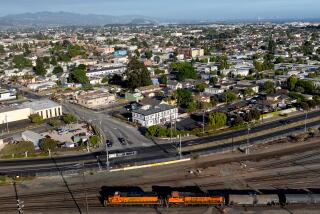Role of the Press: Turn Up Volume or Turn on Lights?
I recently received a letter from a reader who feels my column isn’t tough enough.
The critic was John Walsh of the United Riders of Los Angeles, a well-known community activist who regularly wages assaults on transit district boards with his uninhibited diatribes against the bosses of the bus and train systems.
“As the years roll by, your writing becomes more and more harmless,” Walsh wrote. “You’re the Pillsbury Doughboy of Los Angeles journalism.”
By chance, Walsh’s letter arrived as I was was reading a provocative and troubling book by former Chicago Tribune Editor James D. Squires, “Read All About It! The Corporate Takeover of America’s Newspapers.” Squires says the newspaper business is now run by bean counters who “are primarily concerned . . . not with the preservation of the free press or the conduct of democracy but with the development of the information business in its most profitable form, whatever that may be.”
The two pieces of press criticism got me thinking about the role we journalists play in reporting public affairs. This issue is especially important in the upcoming election for mayor of Los Angeles.
For in this difficult year, in this troubled city, the press bears a heavier responsibility than usual for sorting out the tide of campaign rhetoric. As Squires put it:
“It is the reporting of unfettered truth about how things are and ideas of how they might be made better that motivates a citizenry to act and educates it to courses of action. People cannot govern what they cannot see.”
Now my reader, Mr. Walsh, wants me to deal with L.A.’s troubles as he does in his own no-compromise, you’re-all-crooks speeches. He’d like me to bring down the whole messy structure of politics and government, as the blinded Samson brought down the temple.
That’s not what I do. I’m an explainer, not a revolutionary. I like the Squires rule--shed light so the people can see.
My most recent attempt to shed light began last Saturday in a one-story building on Ventura Boulevard, where Richard Riordan held a rally kicking off his campaign.
Only three or four reporters were there, including just one from television. Unlike a presidential campaign, the press corps in mayoral races is small. Covering a presidential election, you have trouble getting close to the candidates. In this race, you can’t avoid them.
First there was the warm-up, sort of a Reagan-era affair, featuring performers a generation too old for Bill Clinton. Pat Boone looked as fresh as his old milk commercials in his Pepperdine University jacket. Pat had warmed up many a Reagan crowd.
Actor Tom Poston, Howard on the old “Bob Newhart Show,” had some good lines. Youth--at least youth by the event’s standards--was served by the appearance of two sports stars of earlier days, Happy Hairston of the Lakers and Pat Haden, the former USC and Rams quarterback. Retired jocks are Republican rally perennials.
Noting the speakers and remembering that Riordan is a Republican, you’d think the story would be about how the candidate is going after Republican voters in the nonpartisan mayor’s race.
But there was more to it. The master of ceremonies, field director Mike Dolan, in his brown leather jacket, had a definite Clinton-like look. Dolan’s last job was national field director of “Rock The Vote.” While nonpartisan, this successful effort to get out the youth vote was considered to be more helpful to Clinton than to George Bush. Moreover, it turned out that four of Riordan’s staff members are veterans of the Clinton campaign.
In the days ahead, there will be more to learn about the Riordan campaign.
Riordan is an attorney who also is a major property owner and investor. Reporters will sift through the records of his land deals and investments, trying to find out whether they involve him in a conflict of interest. They’ll also comb the records of his many campaign contributors, looking for any potential link between a donation and possible city help with one of his property transactions.
The same sort of reporting job will be done on the other candidates. In addition, the debates--more than 20 have been scheduled so far--will be covered. From Chatsworth to San Pedro, the L.A. political press corps will tail the candidates, not in the media-hyped Clinton bus or Air Force One, but in their own cars, chalking up mileage for the expense accounts they submit to the bean counters.
Attending rallies, chasing candidates, looking up records, interviewing friends and enemies--this is how you shed light on the system. It’s what Jim Squires was talking about when he reminded us that “people cannot govern what they cannot see.”
More to Read
Sign up for Essential California
The most important California stories and recommendations in your inbox every morning.
You may occasionally receive promotional content from the Los Angeles Times.










